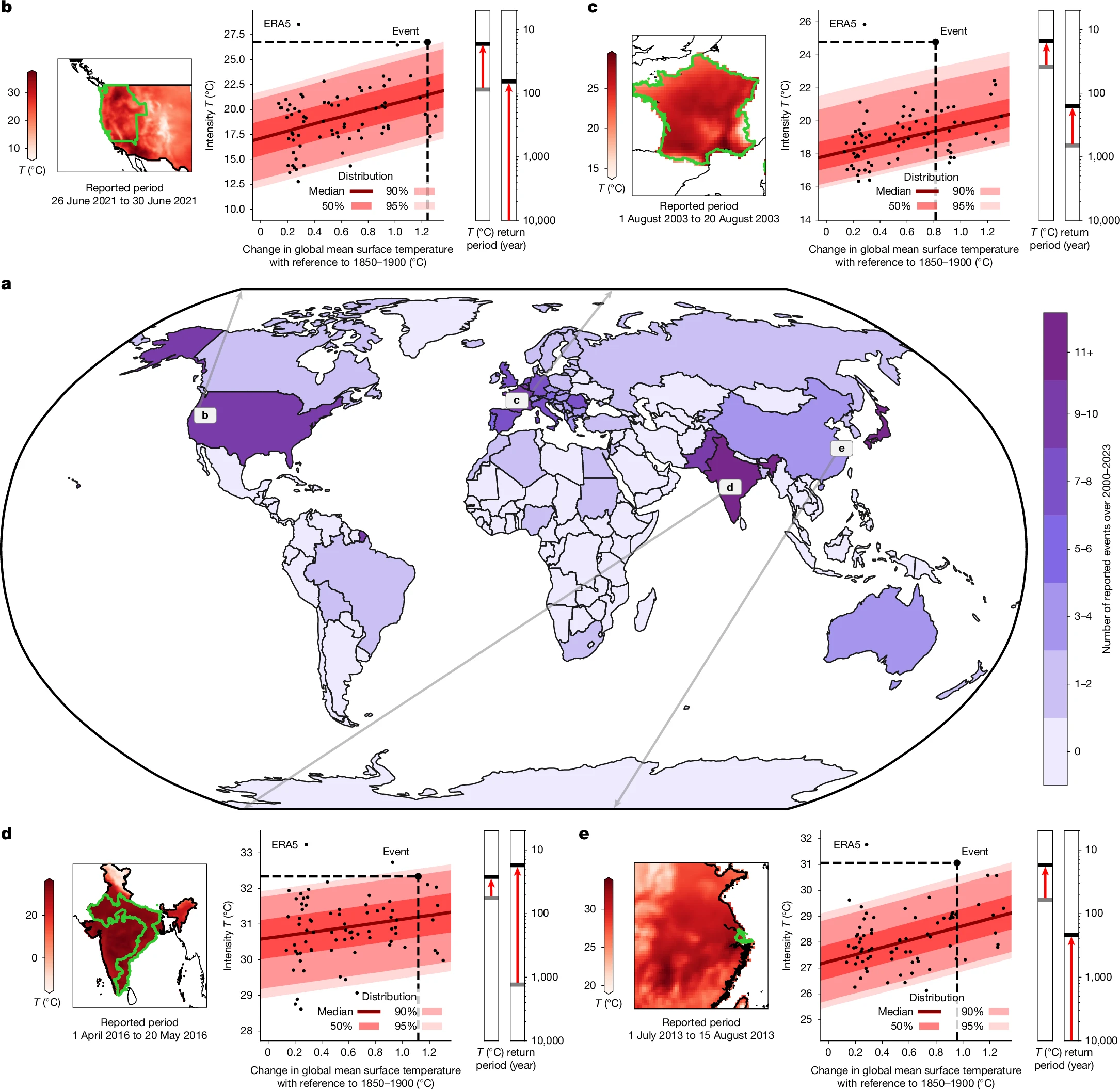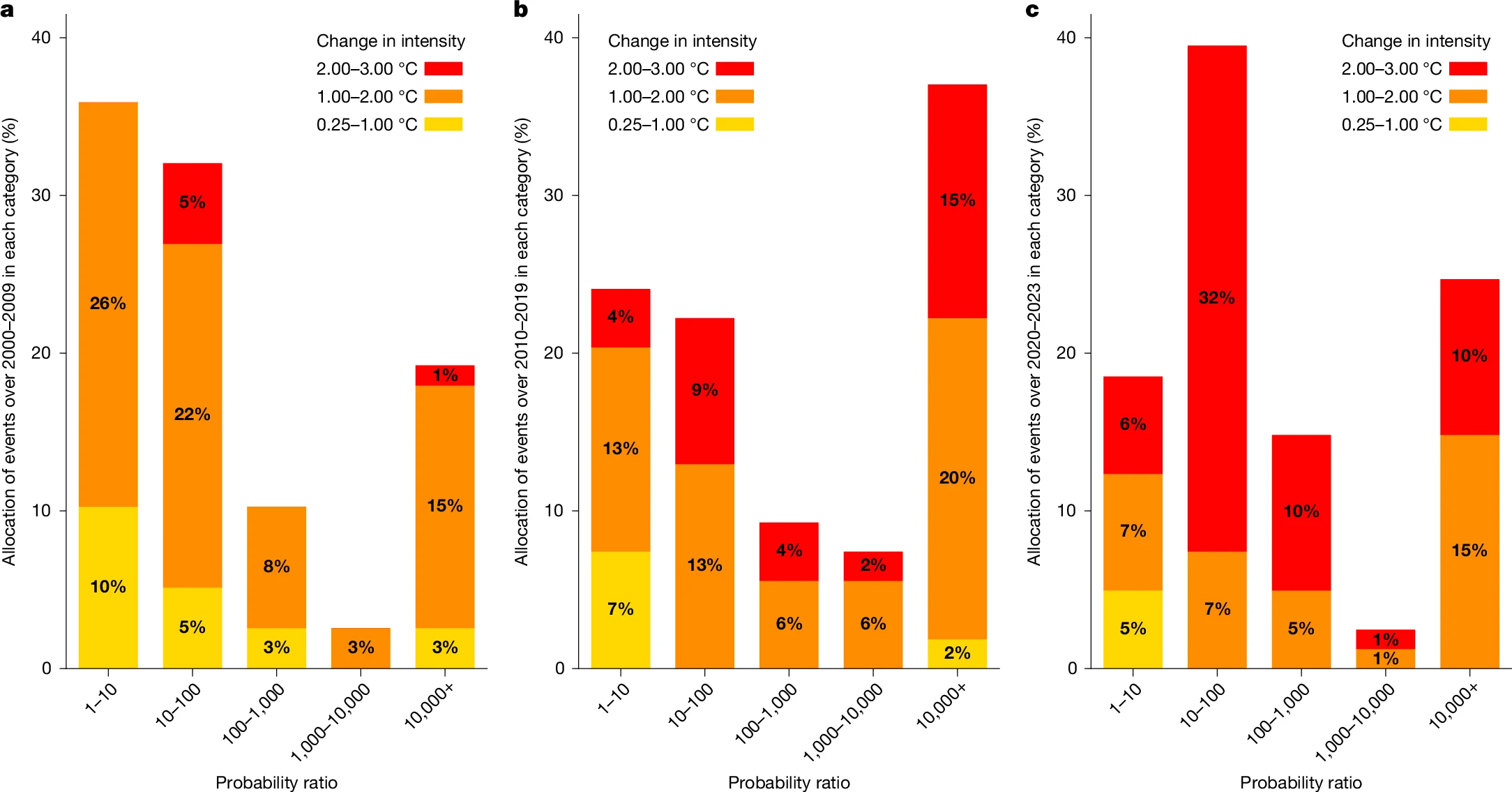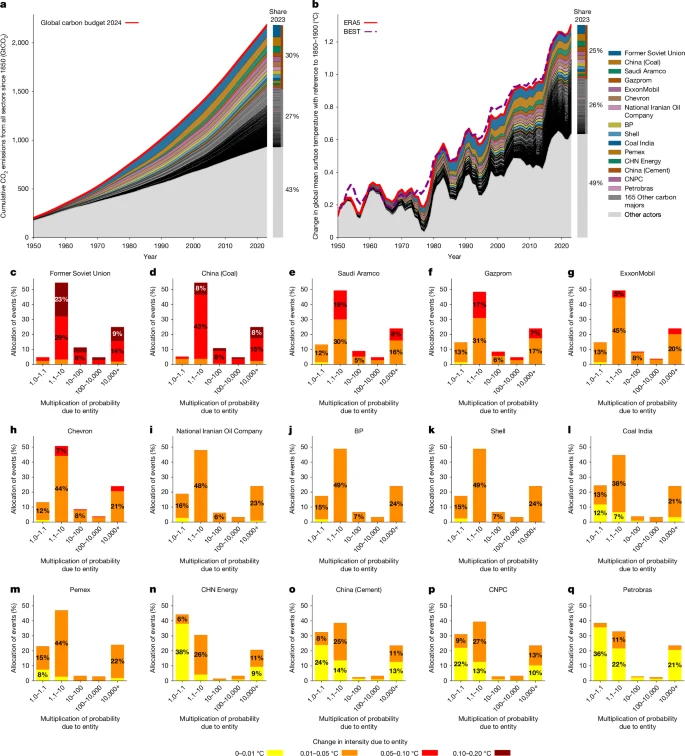Nature has just published a blockbuster new paper on the role of anthropogenic activity in heatwaves from 2000 to 2019. Many articles attribute increasingly wild weather, as in more severe heatwaves, more intense rain producing more floods, and out-of-season temperatures (both hot winters and weird cold snaps in summers). In our daily Links, we’ve highlighted only a comparatively small portion of way-out-of-band events, as well as their impact, from flood deaths to pests and pathogens becoming common in areas where they were formerly absent to significant falls in farm output. Because there are so many of these events now, it seems as if only the ones that produce a catastrophic death count, like flooding in the Punjab or central Texas, or extensive wildfires, such as in Europe and Canada, get much attention outside their region. Yet in a 10 day heatwave in Europe over the summer, 2,300 died, which is 1,500 more that would likely have succumbed otherwise. Extreme heat is also producing or worsening droughts. The image below is from the UN’s World Population Review:

Even with the seemingly overwhelming evidence of climate change, like disappearing glaciers, there’s still a rearguard trying to attribute it to something other than fossil fuel emissions, say solar activity. But courts are siding against that view. From a new KFF Health News story, Climate Activists Cite Health Hazards in Bid To Stop Trump From ‘Unleashing’ Fossil Fuels:
In 2023, a group of 16 young Montanans won a much-heralded climate change case that said the state had deprived them of a “clean and healthful environment,” a right enshrined in Montana’s constitution.
Their victory in Held v. Montana, later upheld by the state Supreme Court, resounded across the country, showing that young people have a stake in the issue of climate change, advocates say. Yet, state policies to address the causes of climate change in Montana — home to large coal, oil, and natural gas deposits — haven’t changed in the wake of the case.
On Sept. 17, some of those plaintiffs are scheduled to appear in federal court to request that U.S. District Judge Dana Christensen block a series of President Donald Trump’s executive orders on energy issues. They argue the orders violate their Fifth Amendment rights and will cause nearly 200,000 additional deaths over the next 25 years and lead to more heart, respiratory, and other health problems. They are joined by other plaintiffs ages 7 to 24 from California, Florida, Hawaii, and Oregon, and are backed by the climate-focused nonprofit Our Children’s Trust….
The plaintiffs are asking the court to declare Trump’s three related executive orders — “Unleashing American Energy,” “Declaring a National Energy Emergency,” and “Reinvigorating America’s Beautiful Clean Coal Industry” — unconstitutional and to block their implementation. They also claim that Trump has overstepped his authority by attempting to undo laws such as the Clean Air Act. A coalition of 14 states’ attorneys general has also filed a lawsuit against the order that declares an energy emergency.
Trump came into office in January primed to support traditional energy sources and to back off efforts to usher in an era of renewable energy, which he claims are not viable. He has also issued orders rolling back environmental regulations. “We are driving a dagger into the heart of the climate change religion to drive down the cost of living for American families, unleash American energy, bring auto jobs back to the U.S., and more,” Environmental Protection Agency Administrator Lee Zeldin said in a March news release.
In July, the EPA proposed repealing its 2009 “endangerment finding” that concluded climate-warming gases “endanger both the public health and the public welfare of current and future generations.”
Actions like this have been successfully challenged in the past. However, some hope that the Held v. Montana ruling will bolster the position of climate-action-seeking plaintiffs.
As much as the judiciary pretends that it rules based on the law alone, interpretations change with shifts in prevailing opinion and with new information challenging the wording of statute and older decisions. So the Nature paper below is important not just in and of itself, but for its potential to move the goalposts by drawing stronger causal links between human action and global warming. The paper, Systematic attribution of heatwaves to the emissions of carbon majors, is too large to embed in this post, so I hope readers will take the time to review it. Its other important contribution is estimating the impact of the biggest fossil fuel emission bad actors. Its abstract:
Extreme event attribution assesses how climate change affected climate extremes, but typically focuses on single events. Furthermore, these attributions rarely quantify the extent to which anthropogenic actors have contributed to these events,. Here we show that climate change made 213 historical heatwaves reported over 2000–2023 more likely and more intense, to which each of the 180 carbon majors (fossil fuel and cement producers) substantially contributed. This work relies on the expansion of a well-established event-based framework1. Owing to global warming since 1850–1900, the median of the heatwaves during 2000–2009 became about 20 times more likely, and about 200 times more likely during 2010–2019. Overall, one-quarter of these events were virtually impossible without climate change. The emissions of the carbon majors contribute to half the increase in heatwave intensity since 1850–1900. Depending on the carbon major, their individual contribution is high enough to enable the occurrence of 16–53 heatwaves that would have been virtually impossible in a preindustrial climate. We, therefore, establish that the influence of climate change on heatwaves has increased, and that all carbon majors, even the smaller ones, contributed substantially to the occurrence of heatwaves. Our results contribute to filling the evidentiary gap to establish accountability of historical climate extremes.
Much of the analysis is over my pay grade, but below are some key graphics:



I hope you will read and circulate this paper. It looks to represent an important step forward in the climate change debate by not only looking at severity of outcomes but also responsible parties.


Well done
Unfortunately it won’t move the needle in the US where the non believers won’t have their minds opened.
The data has been around for decades as to what was and would happen and why in regards to global warming/climate change.
It’s almost impossible to change belief systems with facts. As they are not fact based.
I have seen this first hand many times dealing for example with trying to get solar or wind projects approved. The no people have believed such outrageous and obvious lies it’s hard to comprehend and they won’t be moved from their beliefs. At least most of them.
A classic is the joe Rogan show where he’s stated dozens of time the world is cooling from a report that says and shows via its graph the exact opposite. But even the authors have tried to explain to him he’s wrong but it isn’t seeming to work.
I recommend a podcast called
Professor dave explains
He is really good at debunking all sorts of people claiming to do science.
Fortunately most of the rest of the world gets it and is moving in the right direction
Well, there are not 1 but 2 problems. If the outright denialists were the only one I’d be more hopeful. But then we have those who acknowledge the problem but resolutely oppose any measures that might be conceivably be effective in dealing with the problem that they purportedly care about. Because markets. Because growth. Because it’s easier to imagine the end of civilization than of capitalism. (And I thought that was hyperbole when I first heard it.)
Since we know that Exxon knew I think we can go ahead and assume that the US oligarchs know about climate change and agree with Exxon’s conclusion to plow right ahead. Part of that strategy is to pay people for distributing denialism.
This is a darker conclusion and goes into the theme of nihilism. Though I don’t think it is nihilism, I think just as the original nihilists were called such because they believed in different things (democracy, socialism) then the pillars of 19th century Russian state – the tsar, the military and the church – todays oligarchs aren’t nihilists. They just don’t believe in the propaganda they pay for. I think they believe in power and would rather see the planet burn then give up an iota of power. Aaron Good has a good concept that he calls “crackpot realism” about how US power elites act in a mental world that is constrained by what is necessary for the empire.
(Same link as in a comment below, but sometimes comments are eaten so I figured I would validate the claim seperately.)
Coober Pedy (/ˈkuːbər ˈpiːdi/) is a town in northern South Australia, 846 km (526 mi) north of Adelaide on the Stuart Highway. The town is sometimes referred to as the “opal capital of the world” because of the quantity of precious opals mined there. A blower truck is raised above the town sign, representing the importance of opal mining to the town’s history. Coober Pedy is also renowned for its below-ground dwellings, called “dugouts”, which are built in this fashion due to the scorching daytime heat.
https://en.wikipedia.org/wiki/Coober_Pedy
Thank you Yves. I have read it almost completely. Let’s go to the end of the discussion:
Here the most difficult point I find is whether you can blame it all on the producers and none on the users. IMO, this is always a case of shared responsibilities. But yes, this is a question for legal scholars etc and the risk is then how things passing from the laws of physics into human law are interpreted. Given the current political environment papers like this can also turn to casus belli. Just sayin’
If the producers conspired to destroy “use-less-energy” options for the targetted users, then the producers are to blame.
Here is an example of where a three-way-conspiracy between Firestone Tire and Rubber, General Motors and Standard Oil of New Jersey set up front companies to buy and destroy trolley and streetcar lines all over America in order to destroy already-existing non-car/non-bus travel options for people who were already using them . . . in order to force the sale of more cars, buses, gas and tires. It is titled General Motors Streetcar Conspiracy. Here is the wikilink.
https://en.wikipedia.org/wiki/General_Motors_streetcar_conspiracy
As conspiracy theorists like to say . . . ” It’s not a theory if it happened.”
You also have the Exxon papers were we know that they knew about climate change, had a fairly accurate model around 1980, and then decided to plow tons of money into denialism over decades. That is just the historical record.
As Noam Chomsky (and others) have said, Climate Change and the threat of nuclear war are the preeminent issues facing humanity. Our response, in the main? ‘Drill baby drill,’ and an ‘upgrade’ of nuclear weapons, as well as Arms Race 2.0.
While it seems possible to mitigate these threats, we are going in the opposite direction. Its often said that its because greater profits drive the use of fossil fuels, yet it could be argued that an even more powerful economic stimulus could come from pursuing full-spectum renewables (and oh yeah, cleaner air.) And eliminating the need to control fossil fuel resources would reduce the conflict often associated with this control, and maybe reduce as well the knee-jerk reaction to build bigger and faster weapons than the other guy. It seems unlikely to happen, but at least the possibility to reverse course still is with us….but for how much longer?
The drill baby drill is not real. Yes trump and the republicans are saying that but if you look at the actual drilling rig count and it’s going down. Because the prices are too low to make new fracking gas and oil wells cost effective or even refracking them.
Another self made bind that trump has made for himself, lower FF prices, equals less drilling in the US because it’s more expensive here.
Middle east gas is way way cheaper than US fracked gas.
Biden and the dems pursued high tariffs on chinese solar equipment, thereby making it more expensive. they also put them selves into a self made bind by both wanting more renewables and not china which actually ment they just imported chinese parts and assembled them here for 4X the cost. A terrible decision. That manufacturing has been won by china.
If trump doesn’t put high tariffs on solar and wind and batteries, the loss of the ITC and other tax advantages will have an effect for sure, but the industry will recover pretty quickly once the playing field is understood.
All of the major players in the energy field know that solar/batteries and wind is the cheapest and fastest to get on line. there is a huge backlog for gas turbines, and lack of pipeline capacity. No one is going to be building a new coal plant. Keeping old ones on line, sure.
My point about ‘drill baby drill’ was simply to use it as symbolic of the current administration’s mindset. And while solar, etc are proving to be the way to go, the overall attitude about climate change is that its not something to worry about, and so I at least don’t see any of the urgency that’s needed to pursue a renewable energy focus. And spending worldwide for weapons (“Global military spending reached a record $2.7 trillion in 2024”) is off the charts. How long can that go on?
I have friends who have a cottage complex with a large roof covered with solar panels. works fine in the summer months but as we move to fall it starts to fail. not a problem as they spend much of the winter months in Thailand……. as for the rest of us, wood heat supplements the propane or oil.
I just started reading the 2022 book by David McRaney, “How Minds Change: The Surprising Science of Belief, Opinion, and Persuasion,” so I cannot give a full report on the book. However, his primary point is similar to what is discussed above, that facts rarely convince anyone of anything. In the first chapter he addresses the amazing story of how one lonely conspiracy theorist, Charlie Veitch, was convinced to change his mind (and the blowback he got for it). However, McRaney does see ways to process change through careful emotional contact, which he explores in the second chapter, “Deep Canvassing,” where he looks at the success of the “LAB” in changing minds in California about gay marriage. As a former high school debate team co-captain, I have been both excited and frustrated by what I have read so far. I kind of like slinging around facts! That is part of the fun at naked capitalism, even when I am learning from people who know a lot more than I do. A lot of people do not think that way.
Another book of interest I’m reading now is “All Hell Breaking Loose” by Michael Klare about the Pentagon Response to Climate Change. The Military has long been aware of the situation and knows damn well it’s accelerating.
From part of one description of the book; “While others still debate the causes of global warming, the Pentagon is intensely focused on its effects. Its response makes it clear that where it counts, the immense impact of climate change is not in doubt.”
Unfortunately this blurb (as well as the book) was written in in 2019. I have little doubt that the “intense focus” is no longer a priority as far as our politicians are concerned.
…from flood deaths to pests and pathogens becoming common in areas where they were formerly absent to significant falls in farm output.
I humbly suggest bookmarking AgWeb Farm Journal for daily/weekly review. It is a great resource for both the climate and economic challenges faced by US-based independent farmers and ranchers.
Here in Portugal the Summer of 2025 was the warmest and driest on record and it had 2 record breaking heatwaves, both in temperature extremes and duration. It lasted up to 16 days in some places with temperatures reaching well over 40ºC for much of it. The frog being boiled, though, thinks it was always the case and it is all normal.